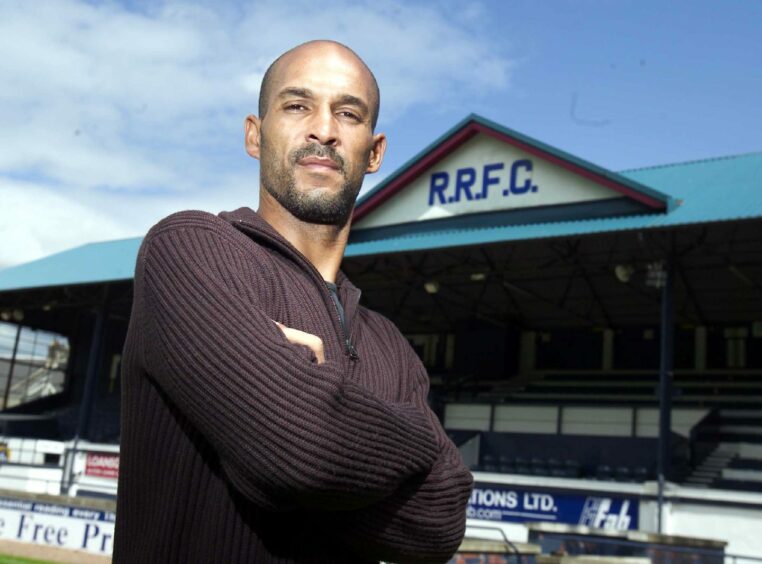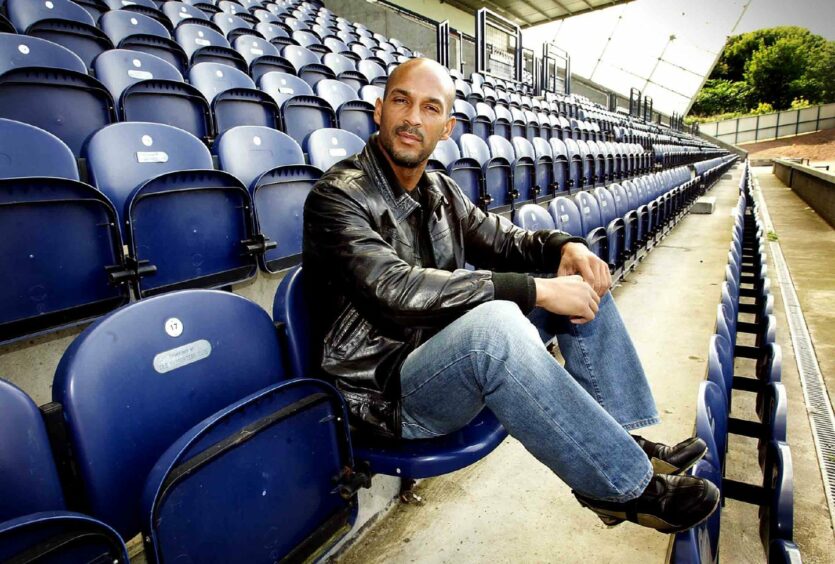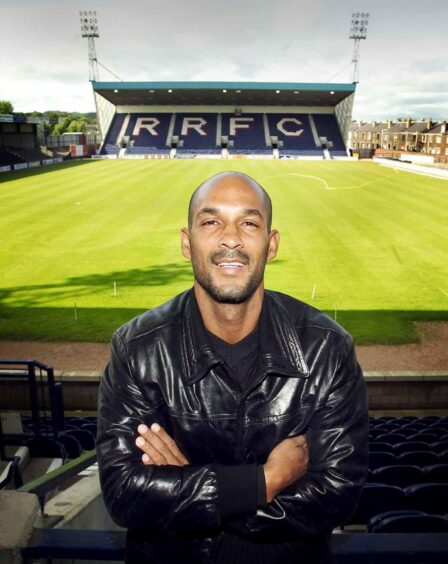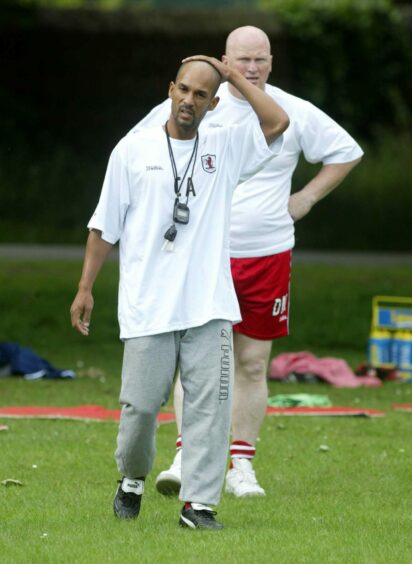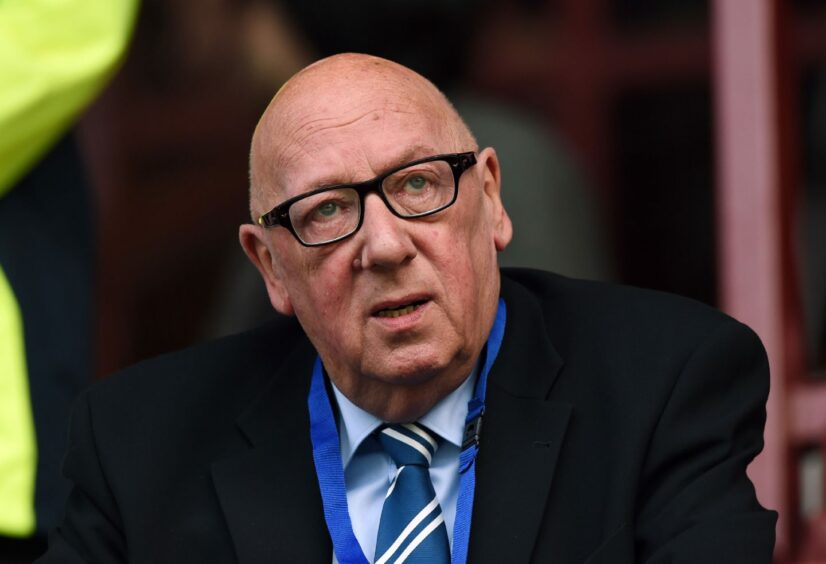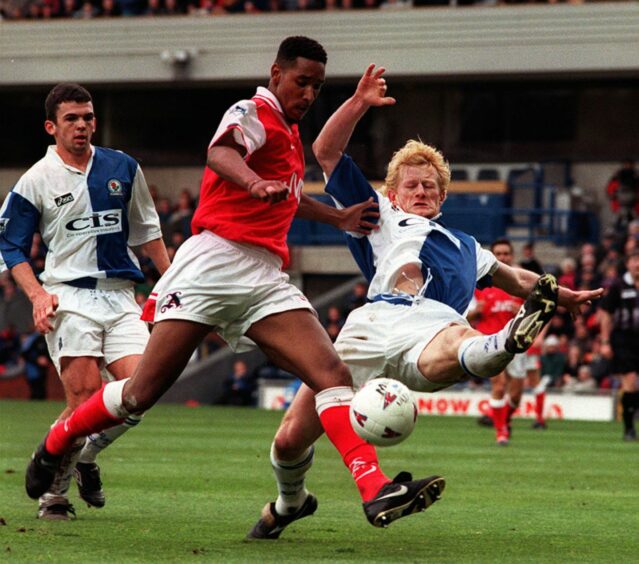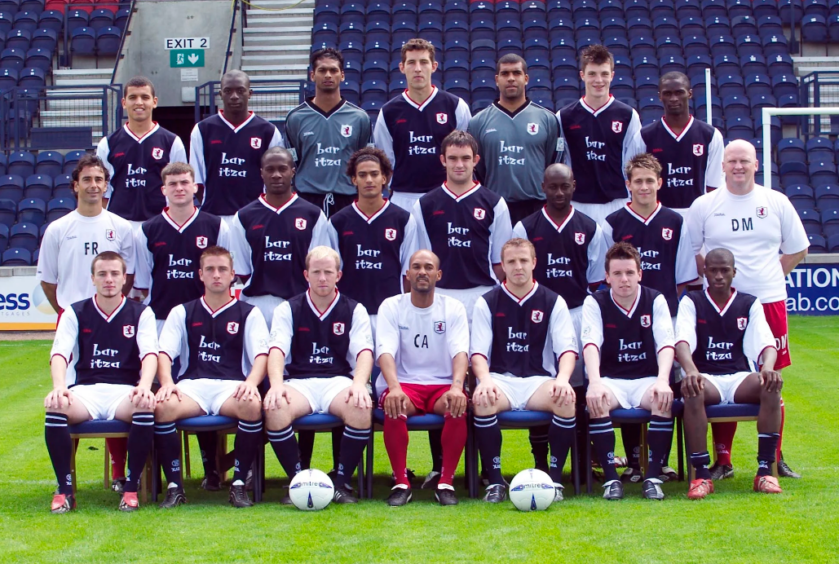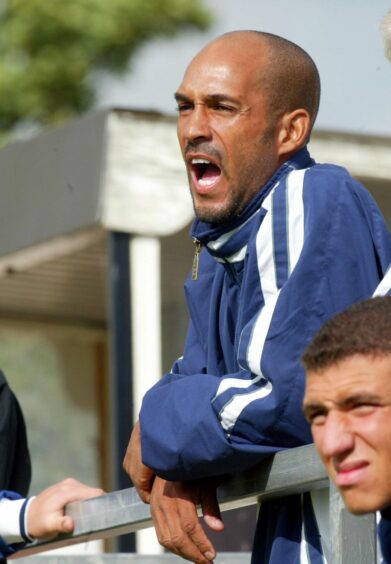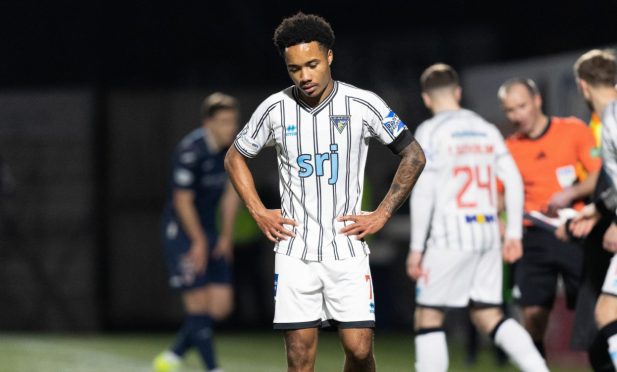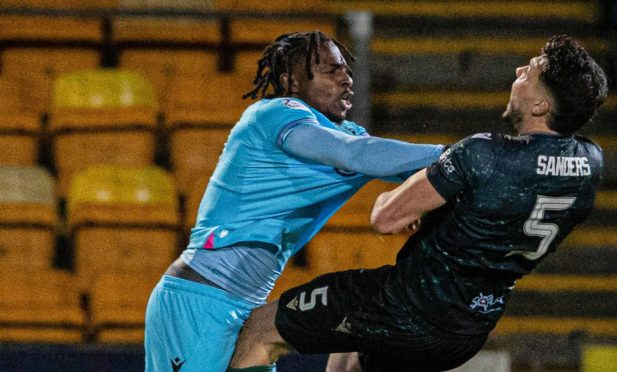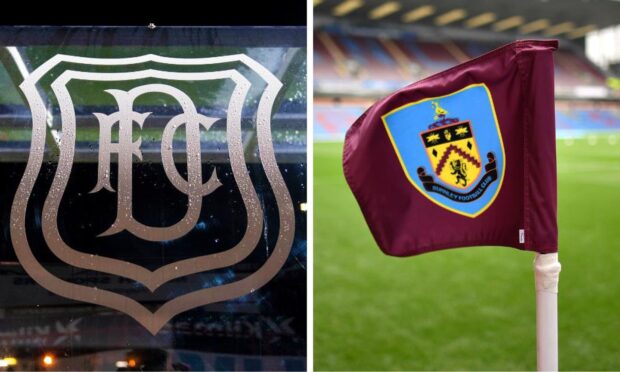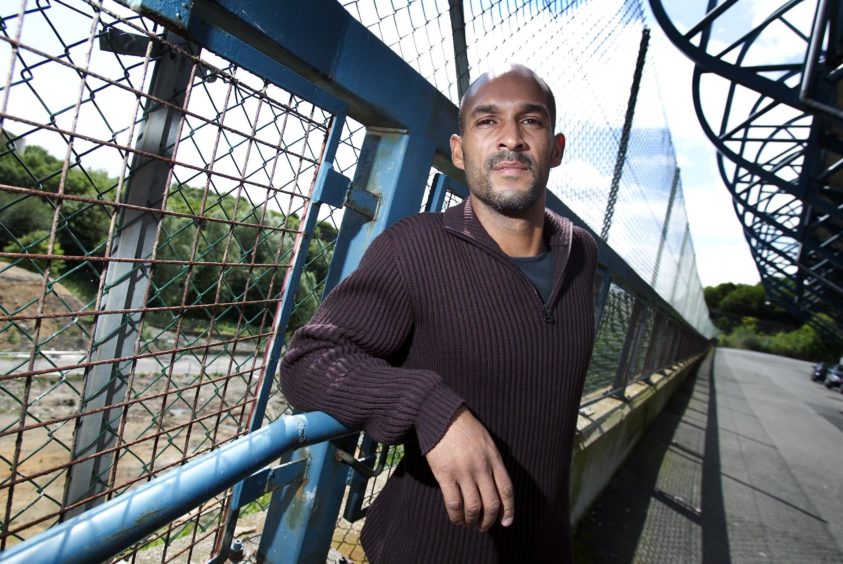
The Frenchman’s short time in charge at Stark’s Park is widely regarded as one of the worst managerial reigns in Scottish football history. How did it go so spectacularly wrong?
Claude Anelka is unmistakably honest when the spectre of his disastrous spell at Raith Rovers is raised.
“I was pretentious,” he tells the Courier. “I didn’t know anything about coaching. When I came to Raith, I didn’t come with a plan.”
His record of 10 matches, one draw and nine defeats – not to mention being knocked out of two cup competitions to lower-league opposition – doesn’t even begin to tell the whole story.
Fans, players, club officials and it seems everyone else involved in Scottish football at the time have trashed Anelka’s short spell in charge at Stark’s Park as one of the worst in managerial history.
Even the 52-year-old has given his 2004 self a good kicking.
Turnbull Hutton, the late former Rovers chairman, said it took four seasons for the Kirkcaldy club to recover from the Anelka experiment.
The Frenchman is now based in Miami where he recently started a new coaching role with Juventus’ US academy, training the U/18s, following three years at PSG’s equivalent in Florida.
And the Anelka name is back in the spotlight thanks to Misunderstood, the hit Netflix documentary about his hugely talented and often controversial brother Nicolas, a Champions League winner who remains a figure of intrigue despite his retirement from the game five years ago.
The Sunshine State lives up to its billing the day Claude – 11 years older than his ex-Arsenal, Real Madrid and Chelsea star sibling – tells us his Raith story over a temperamental Zoom call.
Anelka’s Raith Rovers mistakes
He is friendly, chatty and makes no attempt to sugar-coat what happened in Scotland.
“My time at Raith made me a better coach because you have to make mistakes in order to improve,” the former Versailles, Paris FC and Choisy-Le-Roi player says.
“If you don’t make mistakes then you think everything is fantastic and you don’t learn anything.
“If you make mistakes and evaluate, assess the situation, you fix it for next time. You improve that way.
“I made a lot of mistakes.”
The suggestion that his stint at Raith – then a First Division club – proved to be a learning curve is unlikely to satisfy Rovers supporters who watched their team suffer, however.
At the end of the 2003/04 season, the glory days of the 1990s were in the rear-view mirror for the Fife outfit, with the Coca-Cola Cup triumph under Jimmy Nicholl and taking on Bayern Munich in Europe a thing of the past.
Antonio Calderon was in charge after taking Raith back to Division One and consolidating their place in Scotland’s second tier.
However, financial problems were on the horizon.
Anelka, meanwhile, was looking to invest in a football club.
In 2017, Raith Supporters Trust chairman Alan Russell told Nutmeg Magazine: “With the club haemorrhaging cash and virtual revolving doors installed in both boardroom and manager’s office, Raith Rovers entered their most farcical period.
“The board were approached by Claude Anelka, nightclub DJ and agent/brother of France international Nicolas, who said he intended to transform Raith Rovers into the ‘third force’ in Scottish football.
“Raith Rovers were not the first club he had approached, but we were the first to accept.”
Raith Rovers fulfilled dream
Perhaps unsurprisingly, one of football’s best-known agents was involved.
Anelka says: “I was speaking to Willie McKay and he said to me he knew some people looking for investment and I said: ‘OK, I want a club.
“It was always in my mind – having a club and an academy was my ultimate dream.
“The dream came true too early, in a way! Let me explain, I had the philosophy but not the methodology.
“I was too pretentious in my thinking and I wanted to change everything straight away.
“I fired the coach, I took out some players and I shouldn’t have done that.
“I should have come into Raith, took my time to understand the people, the culture, philosophy, mentality for one year and after make the change.
“But I wanted to do that straight away and it was a mistake.”
In 2012, Hutton (below) told the Tell Him He’s Pele blog that there was scepticism about Anelka’s intentions from the beginning.
He said: “We were made aware of Claude’s eagerness to get involved by Willie McKay, an agent who was known to us at the time through deals that we’d done with him.
“The board was evenly split on whether he should come or not.
“There was a lot of pressure put on the board by certain people who were very keen to bring him in, and they eventually persuaded enough of the board members to back them up for Anelka to come.”
He added: “I didn’t see what he was bringing to the party exactly, other than the obvious – investing into a First Division football club, which at the time, no-one else was willing to do.
“Anelka put around £180,000 into the club and that was the main attraction to it – we were bringing in investment.”
With those funds, the Frenchman took over as both manager and director of football, jettisoning Calderon as coach and bringing in his own players.
The team from the previous season was broken up and footballers from Europe – mainly France’s lower leagues – arrived.
Amid talk of playing like Johan Cruyff’s Barcelona Dream Team and becoming Scotland’s third force, Anelka was confident his young countrymen would shine on these shores before being sold for a profit.
He claims Raith chiefs were well aware of his recruitment strategy.
In came Hamed Sacko, Amar Benaissa, Rudy Pounoussamy, Tomas Hajovsky, Jules Tchimbakala, Herve Ebanda, Medhi Eloujdi, Moussa Ouattara, Maurice Mendy, Peter Ocovan, Nsimba Lusamba and Anthony Bartholome.
Claude Anelka alongside Raith Rovers players and staff ahead of 2004/05 campaign.
Tchimbakala had played 68 games for Toulouse and was a Republic of Congo international while Ocovan went on to have a decent career in his home country, Slovakia.
Ebanda featured for Alloa after leaving Kirkcaldy and striker Sacko later appeared for Guinea in the 2008 Africa Cup of Nations, only to be knocked out by Didier Drogba and Yaya Toure’s Ivory Coast.
Most Raith Rovers signings had never played football
Yet, incredibly, most of the French imports admitted they had never played 11-a-side football before joining Raith Rovers.
Seven-a-sides was their dizziest of heights in the game.
Iain Davidson – now 36 and in his second spell at Stark’s Park – was a young player with his hometown club at the time.
He told the Daily Record in 2010: “You go through good and bad times but Anelka’s reign was the worst ever.
“Being local, I bore the brunt of it. My mates were raging.
“If I was in the supermarket people would stop me and tell me. That’s fair enough. They are diehard fans and this is their club.
“I knew in pre-season that year something wasn’t right. The players didn’t have the basics like controlling a ball. Things you learn as a kid.
“Anelka came in with big ideas but the players he brought in weren’t anywhere near good enough.”
In pre-season, the new-look side won a tournament at Annan Athletic, getting the better of Gretna’s U/19s on penalties in the semi-final before Davidson scored the winner in the final against Stranraer.
Further preparations for the campaign saw them draw 3-3 with Huntly and lose 3-1 to Berwick Rangers.
By the time the real ball came out, discontent had already permeated the squad and Anelka knew it.
“I expected it to be a physical [style of] football,” he said.
Anelka enjoyed Scottish spirit
An animated Anelka on the touchline during Berwick friendly alongside his assistant David Martin.
“I came before making the deal and saw a few games so I wasn’t too surprised when I started.
“The level wasn’t that impressive but when we started the season, everyone strengthened their squad and the level was better.
“It’s the Scottish mentality to fight and never give up. That’s the way it is.
“At the end of the day, it was my fault, I should have been more prepared. It was a stupid mistake, I can say now.
“I also made mistakes with the players I brought, I was young and inexperienced.
“I was unlucky in a way because my best player was injured – a young guy in offensive midfield called Peter Ocovan (pictured below).
“I had players I was counting on but they didn’t play at all because of injury which didn’t help.
“I think I brought seven or eight players but the quality wasn’t good enough.”
There was also mutiny within the Scottish contingent.
Anelka adds: “Things were going well in pre-season, we won a tournament and things were OK. We won and I wasn’t too worried before the season after winning that.
“But when we started against Albion (in the Challenge Cup) and lost two-zero I was shocked with the way we played.
“I didn’t recognise the team and I was shocked. I didn’t recognise some players and afterwards I realised why – the Scottish players boycotted me.
“It was obvious. I saw that when we played and afterwards one player told me. I said: ‘OK, now I understand why some players didn’t play the way they should have played’.
“By then it was almost the end of my time so there wasn’t much I could do. It was confirmed to me afterwards.”
That encounter – against an Albion Rovers team that would lose 6-0 to Gretna the following week and finish second bottom of the Third Division – had been his first managerial test.
The first game of the league campaign against Hamilton at New Douglas Park also ended in defeat.
Despite the earlier results, this was a surprise to Anelka.
He says: “Before the game against Hamilton, I would say I was stressed.
“I felt I was ready for the challenge because I knew what we did in the pre-season tournament and I knew we could handle Hamilton because we played against a few clubs the same level in pre-season.
“I thought we were ready but I was stressed.
“And I was very surprised at the end, I couldn’t believe what I was seeing on the field.
“We couldn’t pass the ball, the ball was in the air all the time.
“I said: ‘This is not the way we play,’ and after I realised why.”
Three days later, Second Division Stranraer dumped Rovers out of the League Cup – the competition they had conquered ten years earlier – at Stair Park.
Then came a 3-2 home defeat to Clyde before an early goal from Sacko at Airdrie helped them get their first point of the season.
That solitary point, however, would be the fruit of Anelka’s labour.
What followed was a horror run – St Johnstone away, defeat. Ross County at home, defeat. Falkirk away, defeat. St Mirren and Queen of the South at home, defeats.
Form guides were not Raith Rovers’ friend.
Anelka with coach Gordon Wallace.
They were now the division’s whipping boys and Anelka’s time as manager was brought to an end on September 29, 2004, with Courier football writer Ian Roache inadvertently breaking the news to him (more on that later).
Replaced by Raith Rovers icon
He was replaced by Stark’s Park legend Gordon Dalziel.
Anelka stayed on as director of football but a month later he, just like his investment (he didn’t ask for any money back), was gone.
The club’s fans, who had made their displeasure loud and clear in demonstrations behind the main stand after games during his tenure, were hurting.
Despite a squad revamp and criticism of recruitment under the previous regime, Dalziel couldn’t prevent Rovers from being relegated.
Anelka admits he is haunted by the memory of letting the support down but claims a lack of support from Raith’s Scottish players left him exposed.
He says: “When you have results everyone loves you, when you have no results no one loves you. That is the way it works and I understand.
“The fans have expectations and when you don’t perform, you have to be out.
“I have no problems with the supporters. I understand why they were angry. That is part of the job and there is no problem for me.
“They had expectation and they welcomed me well. If I don’t do the job properly, I have to leave and bring someone else in.
“They were quite positive to start with, I think. I remember I met the owner of a restaurant who sponsored the club.
“He said one thing I will never forget. He said to me: ‘I trust you’.
“I will never forget that because I am a fair person, when I make mistakes I will say I made a mistake, I am a man of my word.
“When someone says that they trust you, they believe in you that you can do good, but you don’t do good, it’s like I f*** him, I f*** him, I f*** him.
“I never forget that because he gave me his trust and I didn’t perform. I felt like I betrayed him.
“Of course, I feel bad for what happened but it’s a shame I didn’t have a chance to do everything with the team behind me.
“If I had the team behind me, I would say 100% it was my fault. Because the Scottish players didn’t fight for me or do what they should have done it was not completely my fault.
“But I accept my fault.”
He adds: “When I arrived, I was impressed with the stadium, the people, the fans.
“I hadn’t expected it to be as big as it was. When I first came and saw the stadium I said ‘wow!’ I didn’t expect a stadium like this.
“The history of the club, the fans, the people and I realised it was a big deal.
“Sometimes it takes you years afterwards to realise things and at the time I didn’t realise how big the club was in that moment.”
The short and turbulent marriage of the brother of one of the world’s most famous footballers and a provincial Scottish club attracted huge media interest.
Claude insists the portrayal of him and Nicolas (above) – whose transfer fees totalled £108 million before he hung up his boots – in the press has led to many misconceptions about who they are as people.
His younger sibling was nicknamed Le Sulk during his time at Arsenal in the late 1990s and was also a key figure in player mutiny among the France squad at the World Cup in 2010.
“Myself and my brother, they read the newspapers and think they know these guys,” Claude says.
“Something happens and people say: ‘I told you about these guys,’ but it’s bulls***.
“People don’t try to understand but they trust everything they read.
“Sometimes they should put themselves in the situation to understand why, who he is, whatever…I know it happened to me.
“Sometimes it’s a good thing to be named Anelka, sometimes it’s a bad thing to be named Anelka.”
The conversation soon reverts back to the chaos in Kirkcaldy.
He adds: “There are so many stories written about me and Raith Rovers, I just want the truth to be said.
“If I can’t convince people about my good faith and that I am a good person after this, I can’t convince anybody.
Anelka’s Raith Rovers regrets
“I came to Raith with good faith and tried to do a good thing but I didn’t do it the right way.
“Ok, I’m not the only one, not the first one. I made a mistake and I said I’m sorry. It’s not the first time I’ve said I’m sorry but I say it again, I made mistakes.
“That’s it, that’s all I can say.
“I would say I regret going to Raith because if I knew then what I know now it would be different.
“It is part of my life, my story, but it made me stronger.”
The Juventus academy coach has plans to create his own academy in the US.
“Raith taught me a lot,” he says. “Now I have a methodology, now I have a plan!
“You get more mature and you assess situations better. Now, you get in similar situations and you know what to do and what you can’t do.
“It’s about experience. Not just experience only, though, it’s about timing, having the right people, the right players to put everything together.
“If you don’t have these, you will not succeed. Next time in the next opportunity I won’t make the same mistakes.
“And now I know what is my goal and passion – it is developing players as a youth coach. U/13 to U/18, this is what I want to do.”
Rovers, now managed by John McGlynn, are back in the Championship after winning League One last season and they kick off their second-tier campaign at home to Arbroath on October 17.
Anelka has one final message for the Rovers faithful as he signs off from his home in Florida.
“I hope Raith Rovers will regain their success, their past success, and they spend time at the top for a long time,” he says.
“I wish them good luck for the future.”
The Courier’s Ian Roache on his cameo in Claude Anelka’s Raith Rovers dismissal
Strange things can happen to football writers.
For example, I have been greeted by a full-size Dalek inside the main entrance at Dens Park; had a drink with rapper 50-Cent and his entourage in a Reykjavik bar; phoned Dundee director Giovanni di Stefano for a chat about Saturday’s game only to be told by him he would call back as he was currently in court representing murderer Jeremy Bamber; and interviewed a manager while in the nude (him not me).
It is a long list.
However, the Claude Anelka experience matched any of those for its oddness.
The year was 2004 and back in the day as a Courier reporter you would do a Fife circuit once a week, heading to East End Park to discover all things Dunfermline then drive on to Kirkcaldy for a sit down with the Raith Rovers gaffer at Stark’s Park.
It was a nice way to spend an hour or three. You would while away the time motoring from Dundee thinking up lines of questioning and trying to remember the facts from the last match played.
This day was to be different, though.
This would be the one when I broke the news to a manager that he was no longer the manager.
Anelka’s reign had been interesting for the media but not very enjoyable for the Rovers fans.
No wins at all meant you were walking a tightrope when you entered his office – it just wasn’t as narrow as the tightrope on which the Frenchman was walking.
At least it was to be Anelka alone this day. No sign of his mysterious friend/minder Styx, who had seemed to forever be in the background for no apparent reason.
This was the old days – pre-Twitter etc.
The way information got to you during the Fife trip was a message from a colleague or contact.
That was how I got to discover Anelka was toast, at least as Raith’s manager.
Somehow, though, the usual interview was still on so I took my seat in a room inside Stark’s Park and waited, with a little apprehension it has to be said.
After all, no one likes to be asking someone else about losing a job. It is not one of the highlights of a career in journalism.
Indeed, I made a mental note about thanking him for agreeing to chat under the circumstances.
After a bit of a wait, in came Anelka.
He sat down and off I went with something along the lines of: “Sorry to hear that you are no longer the manager…”
He looked at me but said nothing, got up and left the room.
A minute or so passed – it seemed like an hour – before he returned and confirmed that yes, I was right, and he no longer was the manager.
Interview over.
Fans view of Claude Anelka
A fan’s view from Craig Smith, The Courier’s chief reporter (Fife)
It’s like an involuntary affliction.
But when you ask most Raith Rovers fans of a certain vintage – hell, let’s be honest, most Scottish football fans in general – about Claude Anelka, nine times out of 10 you’ll get a wry smirk.
You know the type: the sort of reaction someone gives when asked about something they’d rather forget and hoped wouldn’t be resurrected, like that ill-fated one night stand or that lager shandy too many.
Yet, in a Scottish football world where truth is all too often stranger than fiction, the Anelka chapter most certainly did happen, and remains a cautionary tale for all clubs seeking a quick fix to their troubles.
Like a shark sensing an opportunity, the man better known as Nicolas’ brother – rather than a part-time DJ and football agent – sniffed his way around UK football’s periphery and found ideal prey lying fairly helpless and needy at Stark’s Park.
Financially in a hole, Rovers had just done enough to avoid the drop when Anelka came on the scene, and the Frenchman’s allure – based around the pledge to inject a hefty six-figure sum into the club – proved irresistible at the time.
Supporters initially heard Anelka was coming in as a director of football to work alongside an experienced manager, and that brought all sorts of rumours with it about the type of player that might pull on the Rovers jersey, but it soon emerged he would effectively do both.
And despite the rumblings of discontent in the boardroom we’ve now learned since, Anelka was given free rein to effectively have his own go of the Championship Manager computer game.
Bring in foreign players who sounded decent, completely rip up the squad, make big statements saying he wanted Raith to become Scottish football’s “third force”.
It all looked good on paper but, as we all know, fitba’s not played on paper.
And unlike the computer game, this was real life – and the impact of what the late, great former Rovers chairman Turnbull Hutton once branded a “bloody disaster” is probably still being felt today.
It took the Kirkcaldy club three or four seasons to get back some sort of even keel, although supporters who enjoyed the Coca-Cola Cup win and the European adventure in the mid-90s would probably tell you the ship has been a bit unsteady ever since.
Anelka had a total disregard for and lack of understanding of the Scottish game and thought parachuting guys in from the lower reaches of French and Slovakian football would guarantee a winning team on the park.
Hindsight is, of course, a wonderful thing.
But so is common sense, and there didn’t seem to be much of that going around in the Stark’s Park boardroom back in that fateful summer of 2004.
